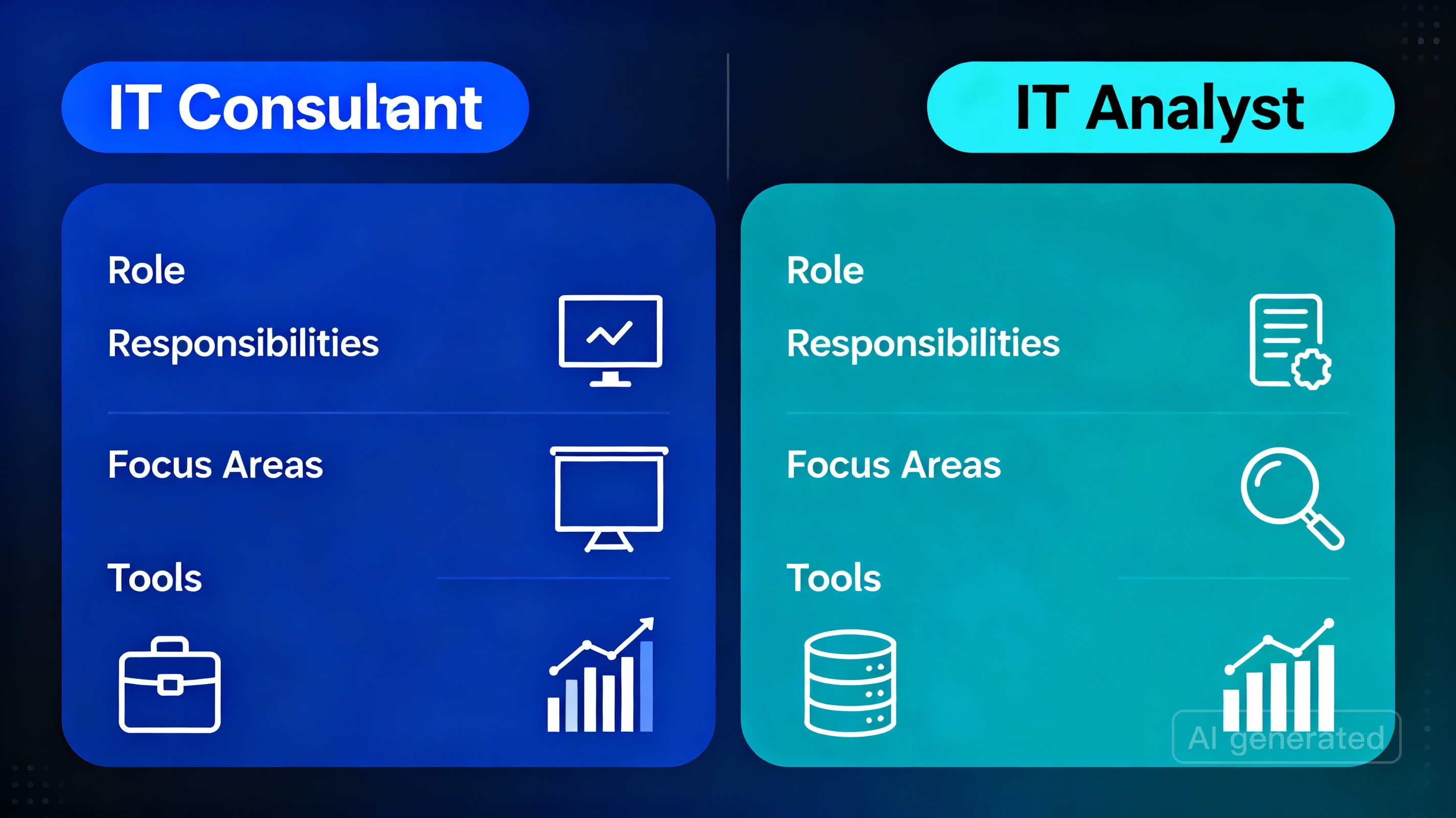In today’s fast-changing digital environment, businesses depend heavily on technology to remain competitive, efficient, and innovative. According to recent studies, more than 91% of businesses are already engaged in some form of digital initiative. However, simply adopting technology is not enough—understanding how to strategically implement, optimise, and manage it is equally crucial. This is where specialised IT professionals such as IT consultants and IT analysts come into play.
While these two roles may seem similar at first glance, they serve different functions and bring distinct value to an organisation. Both are essential in driving digital success, yet their focus areas, responsibilities, and skill sets differ significantly. Understanding these differences can help organisations choose the right professional for their specific needs and ensure that their IT strategies are aligned with their overall business objectives.
This article explores the key distinctions between IT consultants and IT analysts, explaining their roles, areas of expertise, and how each contributes to business success.
Key Takeaways
- IT consultants and IT analysts perform distinct but complementary functions in the IT ecosystem.
- An IT consultant provides strategic advice, helping organisations align technology initiatives with business objectives.
- An IT analyst focuses on analysing systems, identifying inefficiencies, and recommending data-driven solutions.
- Choosing the right professional depends on project requirements, technical complexity, and long-term goals.
- Leveraging IT expertise effectively can transform how businesses operate and compete in the digital world.
What is the Difference Between an IT Consultant and an IT Analyst

Before diving into their specific roles, it is important to understand that both IT consultants and IT analysts aim to enhance how businesses use technology. The difference lies in their focus.
An IT consultant helps organisations design, plan, and implement technology strategies. Their work is often strategic and client-facing, involving guidance, solution design, and technology adoption.
An IT analyst, on the other hand, works within the operational and analytical layers of a company. They analyse data, evaluate systems, and recommend improvements to ensure technology runs efficiently.
Together, they bridge the gap between strategic vision and operational excellence, making them both integral to any modern business.
IT Consultant

An IT consultant is a professional who provides expert guidance on how businesses can best use technology to meet their goals. They advise on technology strategies, IT infrastructure, system integrations, and software solutions. Consultants often work externally, collaborating with clients to design and implement IT systems that enhance productivity and competitiveness.
Their role goes beyond mere advice—they often manage implementation processes, coordinate with vendors, and train staff to ensure smooth technology adoption. For instance, an IT consultant might guide a retail company in implementing an enterprise resource planning (ERP) system to integrate various departments and streamline operations.
IT consultants are also responsible for assessing risks, optimising IT costs, and ensuring that technological investments align with the company’s long-term objectives.
IT Analyst

An IT analyst, sometimes called a systems analyst, focuses more on the internal workings of a company’s IT environment. They evaluate existing systems, identify weaknesses or inefficiencies, and suggest technical improvements. Their work is analytical, data-driven, and operational.
IT analysts bridge the gap between technology and user needs. They often collaborate closely with software developers, system administrators, and management teams to ensure systems are both efficient and user-friendly.
For example, an IT analyst in a healthcare organisation might study patient data management systems, identify data entry bottlenecks, and propose automation tools to save time and reduce errors. Their goal is to optimise processes and improve performance through data and system analysis.
Role and Responsibilities
IT Consultant Responsibilities
The responsibilities of IT consultants are vast and typically strategic. They focus on the bigger picture of how technology fits into a business’s overall goals.
Some of their key responsibilities include:
- Assessing the organisation’s current technology landscape and identifying areas for improvement.
- Designing and developing IT strategies that support long-term business objectives.
- Recommending suitable software, platforms, or infrastructure upgrades.
- Overseeing technology implementations and managing project timelines.
- Training staff to ensure a seamless transition to new systems.
- Managing change effectively to minimise resistance and maximise adoption.
Essentially, IT consultants act as technology partners, guiding businesses through transformation while ensuring alignment between technology and business goals.
IT Analyst Responsibilities
IT analysts focus more on the technical and analytical aspects of IT systems. Their responsibilities are rooted in understanding data, evaluating systems, and making them more efficient.
Key responsibilities include:
- Conducting thorough analysis of existing IT systems and workflows.
- Identifying performance bottlenecks and inefficiencies.
- Recommending solutions to enhance productivity and data accuracy.
- Collaborating with IT teams to implement improvements.
- Creating detailed reports and visualisations to present data insights.
- Ensuring that systems meet user requirements and compliance standards.
While IT consultants focus on the “what” and “why,” IT analysts focus on the “how.” They ensure that the technological foundation of an organisation is solid and that systems perform as intended.
Focus Areas and Expertise
IT Consultant Focus Areas
IT consultants are strategic thinkers who specialise in aligning technology with business strategy. Their focus areas include:
- Strategic IT planning and technology roadmap creation.
- Technology implementation and vendor management.
- Digital transformation and process improvement.
- Project management and leadership.
- Client communication and stakeholder alignment.
They possess expertise in various IT systems and software solutions, along with strong interpersonal and problem-solving skills. Their ability to see the broader business context allows them to deliver solutions that not only solve immediate problems but also drive long-term growth.
IT Analyst Focus Areas
IT analysts excel in turning raw data into actionable insights. Their expertise revolves around:
- Data management and interpretation.
- Statistical analysis and data modelling.
- System testing and performance monitoring.
- Technical documentation and troubleshooting.
- Tools and technologies such as SQL, Excel, Tableau, and Python.
They bring precision, attention to detail, and analytical thinking to their work, helping organisations make data-driven decisions that enhance efficiency and accuracy.
Also Read:Are Franchises a Good Investment?
Comparative Overview
| Aspect | IT Consultant | IT Analyst |
| Role | Provides expert advice and guidance to align IT with business goals | Gathers, analyses, and interprets data to optimise systems |
| Responsibilities | Strategic planning, implementation, and process improvement | Data analysis, modelling, reporting, and troubleshooting |
| Focus Areas | IT systems, project management, communication, business alignment | Data management, visualisation, statistical analysis |
| Expertise | Strategic solutions, project leadership, stakeholder engagement | SQL, Excel, Tableau, Python, analytical tools |
Choosing the Right Professional for Your Needs
When it comes to selecting between an IT consultant and an IT analyst, understanding your project requirements is crucial.
If your organisation is undergoing digital transformation, implementing new systems, or redefining its IT strategy, an IT consultant is the right choice. Their strategic insight ensures that technology investments yield maximum returns.
If your business needs data analysis, performance optimisation, or system improvement, an IT analyst is ideal. They help enhance internal systems, monitor data accuracy, and improve operational workflows.
Other important factors to consider include:
- The complexity and scope of your project.
- The level of expertise and certifications required.
- Familiarity with your industry and business model.
- Communication skills and compatibility with your organisational culture.
Conducting interviews or discussions with potential candidates can also help assess their problem-solving approach and ability to collaborate with your team. Choosing the right IT professional can determine whether your business merely keeps up with digital change or leads the transformation.
Conclusion
In a world where technology defines business success, both IT consultants and IT analysts play crucial roles. Each brings a unique blend of expertise and perspective that can help organisations thrive in the digital age.
IT consultants combine business acumen with technical knowledge to design and implement strategies that drive innovation. They help businesses plan for the future, align IT goals with overall strategy, and ensure smooth execution of technological initiatives.
IT analysts, meanwhile, are the backbone of operational efficiency. They translate data into insights, ensure systems perform optimally, and support decision-making through careful analysis.
The difference between the two lies not in importance but in focus. Together, they form a powerful combination—strategic thinkers and analytical executors—both essential for businesses navigating today’s digital landscape.
FAQs
What is the main difference between an IT consultant and an IT analyst?
An IT consultant focuses on providing strategic advice and technology solutions to help businesses achieve their goals, while an IT analyst focuses on analysing systems, data, and processes to improve efficiency and performance.
Which role should I hire for my business needs?
If you need help designing and implementing a long-term IT strategy, hire an IT consultant. If you want to enhance system performance, manage data effectively, or identify inefficiencies, an IT analyst is the right choice.
Do both IT consultants and IT analysts work with data?
Yes, but in different ways. IT consultants use data for strategic decision-making, while IT analysts work directly with data to identify trends, create reports, and optimise systems.
How can leveraging IT expertise benefit my organisation?
Leveraging IT expertise ensures that your systems and strategies are efficient, data-driven, and aligned with your business goals. It helps increase productivity, reduce costs, and improve decision-making across departments.
Can one person perform both roles?
In smaller organisations, an individual may take on responsibilities of both roles, but in larger companies, these positions are usually distinct to maintain focus and efficiency.

